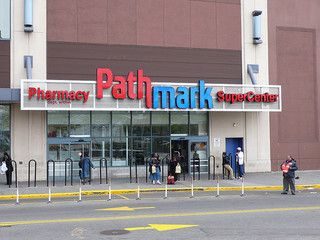Camden’s Only Supermarket, Pathmark, Closes; 238 People Left Jobless As Food Desert Expands

Camden's only supermarket is closing, leaving the city that is already known as a "food desert" even more barren.
According to the Associated Press, the three closing Pathmark supermarkets will leave 238 people jobless. One of the stores is in Camden, N.J., located across the Delaware River from Philadelphia. The other two are in Cherry Hill and Edgewater Park, which are also in South Jersey.
In July, Great Atlantic & Pacific Tea Co. (A&P), parent company of Pathmark, decided to close the Pathmark locations in New Jersey because they were not profitable. Former employees of Pathmark as well as locals are feeling sadness and for some, even anger at the store’s closing.
“This store has been here since 1969, and people have been coming here forever,” Teri Roig, a pharmacy technician who lost her job due to the store’s closing, told the Courier-Post.
Sam Ferraino, president of the United Food and Commercial Workers Local 1360 in Berlin Township, told the Courier-Post that it was a difficult year for supermarkets, noting that many stores in the area have closed, including two Superfresh stores, a Genuardi’s in Cherry Hill, and an Acme in Glassboro.
One of Pathmark’s former employees is Ursula Hardy, a 53-year-old mother of five who had worked at Pathmark since she was 22, making $20 an hour with health benefits. But like many other locals, her memories of the store run deep — it was a neighborhood and community icon in a city that does not have much else left. Camden is notorious for its high levels of unemployment and poverty, and has been designated a “food desert” by the United States Department of Agriculture (USDA). A food desert is an area where it’s nearly impossible to eat healthy due to lack of supermarket options.
Many locals will now have to travel farther to find supermarkets, at least until the new ShopRite will open its doors in 2015. Camden’s population of 77,000 had long survived solely on Pathmark for groceries.
Food deserts are more likely to occur in low-income areas, as there are fewer supermarkets per capita in these places. Lacking access to a vehicle and fresh produce have been barriers to healthy eating for the people of Camden and other low-income areas in the U.S. Food deserts have been linked to the obesity epidemic, as people with fewer healthy options are forced to rely on cheap, unhealthy junk food.
"I'm going to miss the customers, especially the older people," Hardy told the Courier-Post. "Many of them needed help reading their debit cards, or counting their money, because their vision wasn't very good, or they'd need help walking back to their cars. . . . I can't tell you how many funerals I've been to."
She continued, “We were family here. Of course we’re sad.”



























